|
|
|
Sort Order |
|
|
|
Items / Page
|
|
|
|
|
|
|
| Srl | Item |
| 1 |
ID:
090220
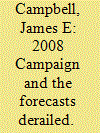

|
|
|
|
|
| Publication |
2009.
|
| Summary/Abstract |
On September 8, 2008, the Trial-heat Forecasting Model predicted that in-party candidate Senator John McCain would receive 52.7% of the national two-party popular presidential vote. The forecast of a victory of modest proportions for Senator McCain reflected his having a five-percentage-point lead over Senator Barack Obama in Gallup's early September, post-convention poll (49% to 44%) and the Bureau of Economic Analysis' August report of a 3.3% GDP growth rate in the second quarter of the year, about average for a second quarter election year economy.
|
|
|
|
|
|
|
|
|
|
|
|
|
|
|
|
| 2 |
ID:
111690
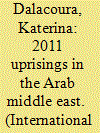

|
|
|
|
|
| Publication |
2012.
|
| Summary/Abstract |
The Arab uprisings of 2011 are still unfolding, but we can already discern patterns of their effects on the Middle East region. This article offers a brief chronology of events, highlighting their inter-connections but also their very diverse origins, trajectories and outcomes. It discusses the economic and political grievances at the root of the uprisings and assesses the degree to which widespread popular mobilization can be attributed to pre-existing political, labour and civil society activism, and social media. It argues that the uprisings' success in overthrowing incumbent regimes depended on the latter's responses and relationships with the army and security services. The rebellions' inclusiveness or lack thereof was also a crucial factor. The article discusses the prospects of democracy in the Arab world following the 2011 events and finds that they are very mixed: while Tunisia, at one end, is on track to achieve positive political reform, Syria, Yemen and Libya are experiencing profound internal division and conflict. In Bahrain the uprising was repressed. In Egypt, which epitomizes many regional trends, change will be limited but, for that reason, possibly more long-lasting. Islamist movements did not lead the uprisings but will benefit from them politically even though, in the long run, political participation may lead to their decline. Finally, the article sketches the varied and ongoing geopolitical implications of the uprisings for Turkish, Iranian and Israeli interests and policies. It assesses Barack Obama's response to the 2011 events and suggests that, despite their profound significance for the politics of the region, they may not alter the main contours of US foreign policy in the Middle East in a major way.
|
|
|
|
|
|
|
|
|
|
|
|
|
|
|
|
| 3 |
ID:
118311
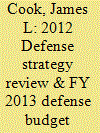

|
|
|
|
|
| Publication |
2013.
|
| Summary/Abstract |
Regardless of whether one is a supporter or a critic, some additional analysis regarding the formulation of the new defense strategic guidance is useful to better understand the rationale for changing defense priorities, the magnitude and impact of these changes within the Department of Defense (DOD), and the review process itself. Specifically, three questions warrant further examination: 1) Why was a DoD-level defense strategy review necessary, given the 2010 Quadrennial Review? 2) What are the implications of this new strategic guidance for the DoD? 3) What are the strategic risks? These questions are addressed by assessing the defense strategic guidance through the lens of strategy and its components: ends, ways, means and risk.
The United States of America is the greatest force for freedom and security that the world has ever known. And in no small measure, that's because we've built the best-trained, best-led, best-equipped military in history - and as Commander-in-Chief, I'm going to keep it that way.
|
|
|
|
|
|
|
|
|
|
|
|
|
|
|
|
| 4 |
ID:
106380
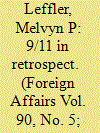

|
|
|
| 5 |
ID:
123079
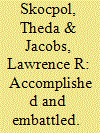

|
|
|
|
|
| Publication |
2012.
|
| Summary/Abstract |
THEDA SKOCPOL and LAWRENCE R. JACOBS assess the policy accomplishments and shortfalls of President Barack Obama since 2009. They highlight the obstacles with which Obama and his political allies have had to contend and challenge commentators who claim that Obama has accomplished little. They explain why conservative and Republican opposition to Obama's presidency has been fierce and unremitting.
|
|
|
|
|
|
|
|
|
|
|
|
|
|
|
|
| 6 |
ID:
118376
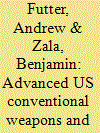

|
|
|
|
|
| Publication |
2013.
|
| Summary/Abstract |
The Obama administration has made a great effort to increase the role of advanced conventional weaponry in US national security thinking and practice, in part to help reinvigorate the global nuclear disarmament agenda by reducing the role played by nuclear weapons in the US defense posture. However, such a strategy is fundamentally flawed because increases in US conventional superiority will exacerbate US relative strength vis-à-vis other powers, and therefore make the prospect of a nuclear weapon-free world seem less attractive to Washington's current and potential nuclear rivals. Consequently, it is highly likely that the impact of efforts to increase US advanced conventional superiority through ballistic missile defense and a conventional "prompt global strike" program will ensure that the Obama administration is adopting a pathway to nuclear abolition on which it is the sole traveler for the foreseeable future.
|
|
|
|
|
|
|
|
|
|
|
|
|
|
|
|
| 7 |
ID:
122758
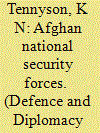

|
|
|
| 8 |
ID:
102185
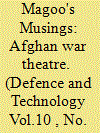

|
|
|
| 9 |
ID:
091297
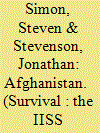

|
|
|
|
|
| Publication |
2009.
|
| Summary/Abstract |
US President Barack Obama's current policy favours escalation in Afghanistan. The idea is that as the United States' military presence in Iraq is drawn down, the use of force can be refocused on Afghanistan to forge a more viable state. The principal instruments of this policy are more American troops with better force protection (a customised version of the counter-insurgency 'surge' employed with ostensible success in Iraq) and firmer bilateral diplomacy with Pakistan. The administration's policy appears to be overdetermined. The premise of the policy is that the United States must 'own' Afghanistan in order to defend its strategic interests. But that premise begs the question of whether US strategic interests actually require the United States to assume the grand and onerous responsibility of rebuilding the Afghan state. They do not.
|
|
|
|
|
|
|
|
|
|
|
|
|
|
|
|
| 10 |
ID:
107147
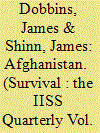

|
|
|
|
|
| Publication |
2011.
|
| Summary/Abstract |
The overarching Western objective in Afghanistan should be to prevent that country from becoming not just a haven for transnational terrorists, but a terrorist ally as well. That was the situation prior to 9/11 and it would be so again if the Taliban returned to power with al-Qaeda backing. NATO can prevent this indefinitely as long as it is willing to commit significant military and economic resources to a counter-insurgency effort. It cannot eliminate the threat, however, as long as the Afghan insurgents enjoy sanctuary in and support from Pakistan. Alternatively, this objective could be achieved if the Taliban could be persuaded to cut its ties to al-Qaeda and end its insurgency in exchange for some role in Afghan governance short of total control.
|
|
|
|
|
|
|
|
|
|
|
|
|
|
|
|
| 11 |
ID:
093936
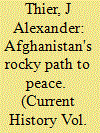

|
|
|
|
|
| Publication |
2010.
|
| Summary/Abstract |
Even if all essential parties are interested in a negotiated settlement, getting to yes is no sure thing.
|
|
|
|
|
|
|
|
|
|
|
|
|
|
|
|
| 12 |
ID:
091987
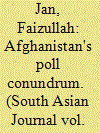

|
|
|
|
|
| Publication |
2009.
|
| Summary/Abstract |
Call it a comedy as some have demonstration elections or a tool of public relations, the fact is that peace in the world hangs by a thin thread, and that thread is a stable,democratic Afghanistan (or at least this is what the US and the West will have us believe).This explains the kind of interest the 20 August 2009 presidential elections engendered in most of the world capitals. However, instead of creating confidence at a global level, the elections have ignited a stream of controversies.
|
|
|
|
|
|
|
|
|
|
|
|
|
|
|
|
| 13 |
ID:
091830
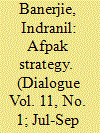

|
|
|
|
|
| Publication |
2009.
|
| Summary/Abstract |
US President Barack Obama is well on his way into implementing his Afpak strategy, which was unveiled shortly after he took office.The idea is to look at the war in Afghanistan in a composite manner, taking into account, among other things, Pakistan's intimate involvement.
|
|
|
|
|
|
|
|
|
|
|
|
|
|
|
|
| 14 |
ID:
130323
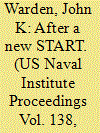

|
|
|
| 15 |
ID:
100990
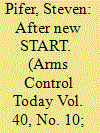

|
|
|
|
|
| Publication |
2010.
|
| Summary/Abstract |
Assuming the New Strategic Arms Reduction Treaty (New START) is ratified and enters into force, the question will be, "What next?" Speaking in Prague in April 2009, President Barack Obama called for reducing the role and number of nuclear weapons and articulated the goal of a world free of nuclear arms, albeit only when certain conditions are met. He and his Russian counterpart, President Dmitry Medvedev, have agreed to a step-by-step process for reducing nuclear weapons.
|
|
|
|
|
|
|
|
|
|
|
|
|
|
|
|
| 16 |
ID:
121029
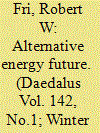

|
|
|
| 17 |
ID:
109529
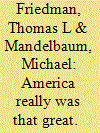

|
|
|
| 18 |
ID:
138698
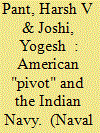

|
|
|
|
|
| Summary/Abstract |
Just after addressing the Shangri-La Dialogue in Singapore in June 2012, Leon Panetta, then the American secretary of defense, visited New Delhi, where he remarked that “defense cooperation with India is a lynchpin in this [pivot] strategy.” Since the thrust of the “pivot” has been on the maritime balance of power in the Indo-Pacific, both the Pacific and the Indian
Oceans have gained tremendous traction in the new U.S. strategy
|
|
|
|
|
|
|
|
|
|
|
|
|
|
|
|
| 19 |
ID:
099316
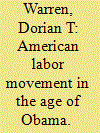

|
|
|
|
|
| Publication |
2010.
|
| Summary/Abstract |
The relative weakness of the American labor movement has broader political consequences, particularly for the ambitions of the Obama presidency. Absent a strong countervailing political constituency like organized labor, well-organized and more powerful stakeholders like business and industry groups are able to exert undue influence in American democracy, thereby frustrating attempts at political reform. I argue that it is impossible to understand the current political situation confronting the Obama administration without an account of the underlying sources of labor weakness in the U.S. In such an account two factors loom especially large. One is the role of the state in structuring labor market institutions and the rules of the game for labor-business interactions. The second is the distinctively racialized character of the U.S. political economy, which has contributed to labor market segmentation, a unique political geography, and the racial division of the U.S. working class. In our current post-industrial, post-civil rights racial and economic order, whether and how the labor movement can overcome its historical racial fragmentation will determine its possibilities for renewal and ultimately its political strength in relation to the Obama presidency. If the labor movement remains an uneven and weak regional organization hobbled by racial fragmentation, the Obama Administration's efforts to advance its core policy agenda will lack the necessary political force to be effective.
|
|
|
|
|
|
|
|
|
|
|
|
|
|
|
|
| 20 |
ID:
118239
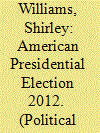

|
|
|
|
|
| Publication |
2012.
|
| Summary/Abstract |
The election of Barack Obama as President of the United States in November 2008 was an electric moment for the whole world, a shock in the course of history. The world's most powerful democracy had chosen a black man from a humble background, grandson of a Kenyan peasant who had risen to be a cook in the British Army. It was a truly amazing reaffirmation of the equal opportunity for all that is the stuff of the American dream. Shirley Williams examines the upcoming election and the players.
|
|
|
|
|
|
|
|
|
|
|
|
|
|
|
|
|
|
|
|
|